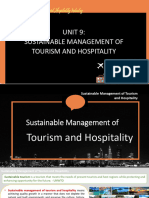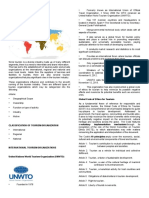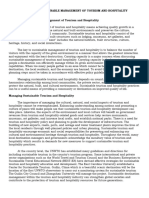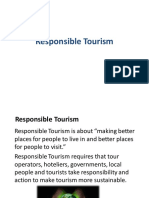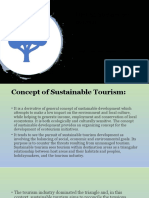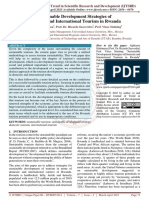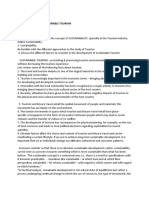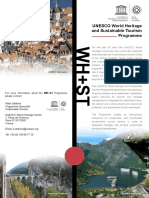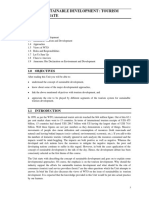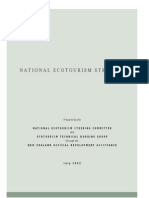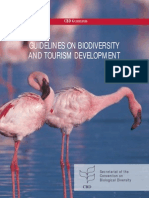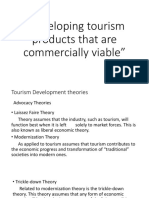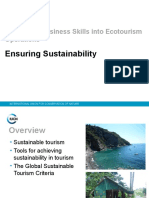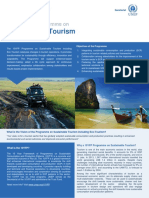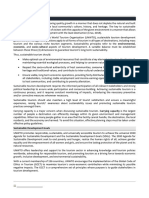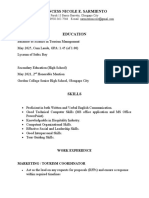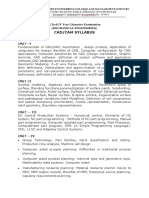SUSTAINABLE TOURISM Prefinals
SUSTAINABLE TOURISM Prefinals
Uploaded by
Nicole SarmientoCopyright:
Available Formats
SUSTAINABLE TOURISM Prefinals
SUSTAINABLE TOURISM Prefinals
Uploaded by
Nicole SarmientoOriginal Title
Copyright
Available Formats
Share this document
Did you find this document useful?
Is this content inappropriate?
Copyright:
Available Formats
SUSTAINABLE TOURISM Prefinals
SUSTAINABLE TOURISM Prefinals
Uploaded by
Nicole SarmientoCopyright:
Available Formats
SUSTAINABLE TOURISM tourism council and business enterprises to
the sustainable travel educational network
SUSTAINABLE MANAGEMENT OF TOURISM
(BEST-EN) have devices and effective
AND HOSPITALITY
strategies for sustainable tourism and
- It is achieving quality growth in a hospitality education and development.
manner that does not deplete the
• Global Code of Ethics for Tourism (GETC) is
natural and built environments.
a comprehensive set of principles
- Preserve the culture, history, and
formulated to direct stakeholders in tourism
heritage of the local community.
and Hospitality development.
Key to sustainable management:
• Intended for governments, the travel
It is to balance the number of visitors with industry, communities, and tourists alike, it
the capacity of the given environment that arrives to help maximize the benefits of the
allows the greatest interaction and sector while minimizing its potentially
enjoyment with the least destruction. negative impact on the environment,
cultural heritage, and societies worldwide.
Major concern: Carrying capacity
• The General Assembly of the United
It is the largest number of people a Nations World Tourism Organization
destination can efficiently manage within its (UNWTO), its recognition by the United
given environment and management Nations two years later expressly motivated
capabilities. UNWTO to promote the active pursuance of
its provisions.
The environment and economy are harmed
when too many people gather in an area THE CODE'S 10 PRINCIPLES COMPRISE THE
that cannot be handled. ECONOMIC, SOCIAL, CULTURAL, AND
ENVIRONMENTAL COMPONENTS OF
An effective solution is managing
TRAVEL AND TOURISM:
sustainable tourism and hospitality that
depends on sound policies. Article 1: Tourism's Contribution to mutual
understanding and Respect between People
MANAGING
and Societies.
UNWTO has established many
Article 2: Tourism as a Vehicle for Individual
guidelines and directions for
and collective fulfillment.
including sustainable tourism in the
country's tourism program. Article 3: Tourism, a Factor of sustainable
development.
• Some international and private sector
organizations such as the world travel and
Article 4: Tourism, a user of the cultural UNDP Roles
heritage of mankind and contributor to its
Accounting for 7% of worldwide exports,
enhancement.
one in 11 jobs, and 10% of the world's GDP,
Article 5: Tourism, is a beneficial activity for the tourism sector, if well managed, can
host countries and communities. stimulate economic growth, social
inclusiveness, and the protection of cultural
Article 6: Obligations of stakeholders in and natural resources.
Tourism development.
The International year enhances tourism's
Article 7: Right to Tourism. role in the following five key areas:
Article 8: Liberty of Tourism movements. 1. Inclusive and sustainable economic
Article 9: Rights of the Workers and growth;
Entrepreneurs in the Tourism Industry. 2. Social inclusiveness, employment, and
Article 10: Implementation of the principles poverty reduction
of the Global Code of Ethics for Tourism. 3. Resource efficiency, environmental
SUSTAINABLE DEVELOPMENT GOALS protection, and climate change;
Known as the Global Goals 4. Cultural values, diversity, and heritage;
Are a universal call to action to end and
poverty 5. Mutual understanding, peace, and
To protect the planet security.
And assure that all people enjoy
peace and prosperity SUSTAINABLE TOURISM AND HOSPITALITY
FRAMEWORK
These 17 interconnected and
interdependent goals constitute the A policy framework is a document that sets
Millennium Development Goals. It also out a set of procedures or goals, which
includes new areas such as: might be used in negotiation or decision-
making to guide a more detailed set of
• Climate change policies or to guide the ongoing
maintenance of an organization's policies.
• Economic inequality
Conservation International and National
• Innovation
Geographic Traveler magazine created
• Sustainable consumption 2002 the World Legacy Awards to recognize
outstanding businesses, organizations, and
• Peace and justice among other priorities
places that have contributed very much in
promoting the principles of sustainable higher quality of life to the local
tourism. population.
The National Geographic Traveler The key to sustainable tourism and
published March 2004 issue, criteria to hospitality is to manage the destination
measure the extent to which worldwide effectively to provide benefits to the local
tourism destinations follow the best population, to enrich the visit of the
practices in sustainable tourism and tourist, and to preserve the tourism and
hospitality development. hospitality products for future generations
to enjoy.
1. Environment and ecological quality
____________________________________
2. Social and cultural integrity;
CARRYING CAPACITY
3. Condition of any historic building and
archeological site; As such, carrying capacity in a recreational
context refers to the amount and type of
4. Aesthetic appeal;
use that can be accommodated in a
5. Quality of tourism and hospitality particular area over time, while sustaining
management; and desired biophysical resource conditions and
opportunities for high-quality visitor
6. Overall outlook for the future. experiences at given levels of management
input.
The National Geographic Traveler
published a special study on sustainable Examples of Specific Management Options
tourism practices in the National Parks of to Reduce Visitor Impacts
Canada and the United States.
Seasonal or temporal limits
BENEFITS
limiting visiting times; restricting car
The economic benefits of successful parking, accommodation facilities, or public
sustainable tourism and hospitality transport; ensuring visits occurs at
management include developing new appropriate times of day (which may vary
businesses, expanding job opportunities, diurnally and seasonally)
increasing income, marketing new
products, improving infrastructure, Regulating group size
encouraging diversification, integrating
particularly for specialist activities; requiring
the local economy and special
pre-registration (visits only by prior
opportunities with other services and
arrangement); providing guided tours that
products, promoting community pride, and
allow for more control and maximize
enjoyment.
▶ involves local people in decisions that
affect their lives and life changes;
▶ makes positive contributions to the
Restricting visitor behavior
conservation of natural and cultural
e.g., ensuring that visitors stay on specified heritage, to the maintenance of the world’s
routes and do not trample vegetation or diversity;
disturb animals, and that noise and the use
▶ provides more enjoyable experiences for
of light at night (e.g., during visits to turtle
tourists through more meaningful
nesting beaches) are minimized. (ex. Tarsier
connections with local people, and a greater
at Bohol)
understanding of local cultural, social, and
What is Responsible Tourism? environmental issues;
▶ Responsible Tourism was defined in Cape ▶ provide access for people with disabilities
Town in 2002 alongside the World Summit and the disadvantaged;
on Sustainable Development. This
▶ is culturally sensitive, engenders respect
definition, the Cape Town Declaration is
between tourists and hosts, and builds local
now widely accepted and was been
pride and confidence.
adopted by the World Travel Market in 2007
for World Responsible Tourism Day. ▶ Behavior can be more or less responsible
and what is responsible in a particular place
▶ Responsible Tourism is about “making
depends upon the environment and culture.
better places for people to live in and better
places for people to visit.” Responsible
Tourism requires that operators, hoteliers,
governments, local people, and tourists take
responsibility, and take action to make
tourism more sustainable.
“Responsible tourism is tourism which:
▶minimizes negative economic,
environmental, and social impacts;
▶ generates greater economic benefits for
local people and enhances the well-being of
the host communities improves working
conditions and access to the industry;
You might also like
- ASME BPVC 2023 Section II Part A-1 - 169-178Document10 pagesASME BPVC 2023 Section II Part A-1 - 169-178MargaritaNo ratings yet
- Sustainable Tourism: Principles, Contexts and PracticesFrom EverandSustainable Tourism: Principles, Contexts and PracticesNo ratings yet
- Responsible TourismDocument36 pagesResponsible TourismNight Core Gaming100% (2)
- Unit Test Circular Motion Anmd Universal Gravitation 1Document4 pagesUnit Test Circular Motion Anmd Universal Gravitation 1Nandhu RamkumarNo ratings yet
- SUSTAINABLE TOURISM PrefinalsDocument4 pagesSUSTAINABLE TOURISM PrefinalsNicole SarmientoNo ratings yet
- THC 1101 Unit 9 - Sustainable Management of Tourism and HospitalityDocument20 pagesTHC 1101 Unit 9 - Sustainable Management of Tourism and HospitalityAyresh SheynNo ratings yet
- Sustainable Tourism & Hospitality Assessment & DevelopmentDocument19 pagesSustainable Tourism & Hospitality Assessment & DevelopmentJUN GERONANo ratings yet
- Sustainable Tourism Reviewer: SustainabilityDocument5 pagesSustainable Tourism Reviewer: SustainabilityKhatelyn CodillaNo ratings yet
- Sustainable Tourism Topic 2Document19 pagesSustainable Tourism Topic 2Rose Ann CorsameNo ratings yet
- Sustainable Tourism and Hospitality ManagementDocument26 pagesSustainable Tourism and Hospitality ManagementTristan Pablo100% (3)
- Week 9Document26 pagesWeek 9Kishly BarrientosNo ratings yet
- Concepts of Sustainable TourismDocument8 pagesConcepts of Sustainable TourismRashik KuinkelNo ratings yet
- Sustainable Tourism Prelim Reviewer Topic 1 To 6 (Complete)Document12 pagesSustainable Tourism Prelim Reviewer Topic 1 To 6 (Complete)deniseangelarodrigoNo ratings yet
- Lesson 6 Macro PerspectiveDocument14 pagesLesson 6 Macro PerspectiveMISS MIKEENo ratings yet
- Macro Perspective Chapters 8&9Document15 pagesMacro Perspective Chapters 8&9aslongasshortNo ratings yet
- THC Chapt 9Document2 pagesTHC Chapt 9Pein MwaNo ratings yet
- Chapter 9 MacroDocument11 pagesChapter 9 MacroRoy CabarlesNo ratings yet
- 1 - Sustainable Tourism DevelopmentDocument24 pages1 - Sustainable Tourism DevelopmentmijaNo ratings yet
- PoT 1 CH 9Document15 pagesPoT 1 CH 9John Carlo DagdagNo ratings yet
- Sustainable Management of T H Report 1Document61 pagesSustainable Management of T H Report 1necely babeloniaNo ratings yet
- Unit - 4Document22 pagesUnit - 4puskarcing16No ratings yet
- SUTO411 Week2 5Document11 pagesSUTO411 Week2 5xxparkjihoon12No ratings yet
- ST 1Document5 pagesST 1HarilyNo ratings yet
- Responsible TourismDocument16 pagesResponsible TourismVishnu BNo ratings yet
- Sustainable Rural Tourism Practices in Madang Province, Papua New GuineaDocument13 pagesSustainable Rural Tourism Practices in Madang Province, Papua New GuineaZebedee TaltalNo ratings yet
- Sustainable TourismDocument21 pagesSustainable TourismChristian TuberaNo ratings yet
- EcotourismDocument3 pagesEcotourismThanoj KumarNo ratings yet
- Week 2Document26 pagesWeek 2Dyya EllenaNo ratings yet
- Chapter 1Document12 pagesChapter 1Hannah MaureenNo ratings yet
- Sustainable Development Strategies of Domestic and International Tourism in RwandaDocument26 pagesSustainable Development Strategies of Domestic and International Tourism in RwandaEditor IJTSRDNo ratings yet
- Introduction To Sustainable TourismDocument6 pagesIntroduction To Sustainable TourismJanella LlamasNo ratings yet
- GROUP_7_WRITTEN_REPORT_IntroductionDocument11 pagesGROUP_7_WRITTEN_REPORT_Introductionlacbayenarjie2002No ratings yet
- Chapter 6Document19 pagesChapter 6Siti NabilahNo ratings yet
- SAM PBK - STDev 2023 UGM 16022023 Rev1Document49 pagesSAM PBK - STDev 2023 UGM 16022023 Rev1Staf Ahli Menteri PBKNo ratings yet
- THC 115 - Module For Week No. 8Document14 pagesTHC 115 - Module For Week No. 8Tea cherNo ratings yet
- 03chapters5 6 PDFDocument28 pages03chapters5 6 PDFJammie Fritz CastilloNo ratings yet
- Sustainable Development Final2Document72 pagesSustainable Development Final2NicolleNo ratings yet
- Sustainable Tourism Development A CritiqueDocument22 pagesSustainable Tourism Development A CritiqueEditor IJTSRDNo ratings yet
- Apuntes Turismo Segundo ExamenDocument25 pagesApuntes Turismo Segundo Examen875saporuNo ratings yet
- UNESCO World Heritage and Sustainable Tourism ProgrammeDocument2 pagesUNESCO World Heritage and Sustainable Tourism ProgrammeGary BolañosNo ratings yet
- Week 2 May 22Document46 pagesWeek 2 May 22Fahim Ahmed100% (1)
- Sustainable Development Tourism DebateDocument13 pagesSustainable Development Tourism DebateAnvesh VakadiNo ratings yet
- UNIT 1: Sustainable Tourism: Definitions and PrinciplesDocument5 pagesUNIT 1: Sustainable Tourism: Definitions and PrinciplesRachelle Mae SalvadorNo ratings yet
- PPT-tourDocument17 pagesPPT-tourMa LeslieNo ratings yet
- National Eco Tourism StrategyDocument62 pagesNational Eco Tourism StrategyChrysmae AcedoNo ratings yet
- National Ecotourism Strategy (NES) PDFDocument62 pagesNational Ecotourism Strategy (NES) PDFDENR PAMBCSNo ratings yet
- Guidelines On Biodiversity and Tourism Development: CBD GDocument34 pagesGuidelines On Biodiversity and Tourism Development: CBD GAura MateiuNo ratings yet
- Sustainable Management of Tourism and HospitalityDocument6 pagesSustainable Management of Tourism and HospitalityDal.giNo ratings yet
- Developing Tourism Products That Are Commercially ViableDocument19 pagesDeveloping Tourism Products That Are Commercially Viableeloisa burroNo ratings yet
- Developing Tourism Products That Are Commercially ViableDocument19 pagesDeveloping Tourism Products That Are Commercially Viableeloisa burroNo ratings yet
- Ensuring Sustainability: Integrating Business Skills Into Ecotourism OperationsDocument9 pagesEnsuring Sustainability: Integrating Business Skills Into Ecotourism OperationsUmar SaleemNo ratings yet
- CONCEPT of SUSTAINABLE TOURISMDocument22 pagesCONCEPT of SUSTAINABLE TOURISManamejico. clarcNo ratings yet
- Unit 3 Eco - Tourism NotesDocument6 pagesUnit 3 Eco - Tourism NotesTarun RnNo ratings yet
- Sustainable Tourism: The 10YFP Programme OnDocument4 pagesSustainable Tourism: The 10YFP Programme OnAdrienn HargitaiNo ratings yet
- Elethp02 C7Document17 pagesElethp02 C7JUN GERONANo ratings yet
- Turismo Acces I Blew Eben OkDocument20 pagesTurismo Acces I Blew Eben OkHAFIZI ZAMRINo ratings yet
- 07 Handout 1Document5 pages07 Handout 1xzyneberdin79No ratings yet
- Sustainable TourismDocument7 pagesSustainable TourismAllana Mae Dasalla100% (1)
- Tourism and Sustainability: A Win-Win StrategyDocument29 pagesTourism and Sustainability: A Win-Win StrategyfedricktoppoNo ratings yet
- Global Code of Ethics For TourismDocument19 pagesGlobal Code of Ethics For TourismAngela May VersoNo ratings yet
- Management of Eco-tourism and its Perception: A Case Study of BelizeFrom EverandManagement of Eco-tourism and its Perception: A Case Study of BelizeNo ratings yet
- The Ultimate Career Guide in The Tourism and Hospitality Industry: one call, #1From EverandThe Ultimate Career Guide in The Tourism and Hospitality Industry: one call, #1No ratings yet
- Activity 3-ENG-sarmientoDocument1 pageActivity 3-ENG-sarmientoNicole SarmientoNo ratings yet
- Tour and Travel Management ReviewerrrrrrDocument2 pagesTour and Travel Management ReviewerrrrrrNicole SarmientoNo ratings yet
- Sarmiento-Week 3Document4 pagesSarmiento-Week 3Nicole SarmientoNo ratings yet
- Rules & Regulations of BasketballDocument18 pagesRules & Regulations of BasketballNicole SarmientoNo ratings yet
- Sarmiento-ENG102-Week 6 ActivityDocument5 pagesSarmiento-ENG102-Week 6 ActivityNicole SarmientoNo ratings yet
- Week 3 - LM - Readings in Philippine History - Tejeros Convention 1897Document6 pagesWeek 3 - LM - Readings in Philippine History - Tejeros Convention 1897Nicole SarmientoNo ratings yet
- Sarmiento-Grp 1Document2 pagesSarmiento-Grp 1Nicole SarmientoNo ratings yet
- Self Compassionate LetterDocument2 pagesSelf Compassionate LetterNicole SarmientoNo ratings yet
- Rules & Regulations of BasketballDocument18 pagesRules & Regulations of BasketballNicole SarmientoNo ratings yet
- DebateeeeDocument12 pagesDebateeeeNicole SarmientoNo ratings yet
- Tourism Impact AssessmentDocument9 pagesTourism Impact AssessmentNicole Sarmiento100% (1)
- Reviewer Travel AgencyDocument10 pagesReviewer Travel AgencyNicole SarmientoNo ratings yet
- Jamela Sueno Activity 11Document2 pagesJamela Sueno Activity 11Nicole SarmientoNo ratings yet
- Understanding The SelfDocument4 pagesUnderstanding The SelfNicole SarmientoNo ratings yet
- Resume - SarmientoDocument2 pagesResume - SarmientoNicole SarmientoNo ratings yet
- Reviewer Travel AgencyDocument8 pagesReviewer Travel AgencyNicole SarmientoNo ratings yet
- Sarmiento - Prefinal Accounting ActivityDocument11 pagesSarmiento - Prefinal Accounting ActivityNicole SarmientoNo ratings yet
- DVD Player-Grp 2-SarmientoDocument4 pagesDVD Player-Grp 2-SarmientoNicole SarmientoNo ratings yet
- Week 10-11 SarmientoDocument2 pagesWeek 10-11 SarmientoNicole SarmientoNo ratings yet
- Sarmiento - Prelim ExamDocument3 pagesSarmiento - Prelim ExamNicole SarmientoNo ratings yet
- Sarmiento-ENG102-Week 4 ActivityDocument7 pagesSarmiento-ENG102-Week 4 ActivityNicole SarmientoNo ratings yet
- Paraguay and ChileDocument13 pagesParaguay and ChileNicole SarmientoNo ratings yet
- Significant Appeals of CruisingDocument2 pagesSignificant Appeals of CruisingNicole SarmientoNo ratings yet
- Sarmiento PE102 ActivityDocument1 pageSarmiento PE102 ActivityNicole SarmientoNo ratings yet
- Sarmiento-Week 15Document1 pageSarmiento-Week 15Nicole SarmientoNo ratings yet
- Tour and Travel ManagementtttDocument6 pagesTour and Travel ManagementtttNicole SarmientoNo ratings yet
- sarmiento-ENG102-week 8 ActivityDocument8 pagessarmiento-ENG102-week 8 ActivityNicole SarmientoNo ratings yet
- Sarmiento-ENG102-Week 6 ActivityDocument5 pagesSarmiento-ENG102-Week 6 ActivityNicole SarmientoNo ratings yet
- Should Same-Sex Marriage Be LegalizedDocument4 pagesShould Same-Sex Marriage Be LegalizedNicole SarmientoNo ratings yet
- What Can I Sow? When Can I Sow It? Where Can I Sow It?Document1 pageWhat Can I Sow? When Can I Sow It? Where Can I Sow It?Cristina ModrîngaNo ratings yet
- Mentor Graphics Lab ManualDocument27 pagesMentor Graphics Lab ManualHavi KosuruNo ratings yet
- P3000UWS01L футеровкаDocument12 pagesP3000UWS01L футеровкаmikhail.glotov087No ratings yet
- Brochure Kinetrol PDFDocument44 pagesBrochure Kinetrol PDFPaulo PacaviraNo ratings yet
- Ring CanDocument1 pageRing CanMitu ChowdhuryNo ratings yet
- MDS Rank List-June 2019 (2016 Admission)Document2 pagesMDS Rank List-June 2019 (2016 Admission)HARITHA H.PNo ratings yet
- Science Curriculum - Grade 3Document15 pagesScience Curriculum - Grade 3nkundraNo ratings yet
- EntropyDocument30 pagesEntropyRavi PaswanNo ratings yet
- Design and Fabrication of Groundnut Pods and Shell Stripper: April 2018Document6 pagesDesign and Fabrication of Groundnut Pods and Shell Stripper: April 2018Sanket WaradeNo ratings yet
- The Citadel Department of Electrical Engineering: Find: SolutionDocument12 pagesThe Citadel Department of Electrical Engineering: Find: SolutionTuấn VũNo ratings yet
- BSS 310 Group Project1Document40 pagesBSS 310 Group Project1Vaibhav ParshutamNo ratings yet
- 3.12 Project: Personality Report: By: Álvaro Huidobro MouvetDocument10 pages3.12 Project: Personality Report: By: Álvaro Huidobro MouvetAlvaro Huidobro0% (1)
- TH 9800 ModsDocument4 pagesTH 9800 ModsBenjamin DoverNo ratings yet
- MR - Abhishek JiDocument4 pagesMR - Abhishek Jimalikgaurav01No ratings yet
- Bedienungsanleitung S200 400 V01 2019 ENDocument145 pagesBedienungsanleitung S200 400 V01 2019 ENAriel Horta LoeraNo ratings yet
- Septic Vault Detail: Vicinity MapDocument1 pageSeptic Vault Detail: Vicinity Mapysog808No ratings yet
- Total Abdominal Hysterectomy in A Patient With I 2024 International JournalDocument3 pagesTotal Abdominal Hysterectomy in A Patient With I 2024 International JournalRonald QuezadaNo ratings yet
- Tinea - The DermatophytesDocument67 pagesTinea - The Dermatophytesmansoor aliNo ratings yet
- NRZIDocument19 pagesNRZIapi-3754722100% (1)
- Avn System Santa Fe: Owner's ManualDocument34 pagesAvn System Santa Fe: Owner's Manualsergio fuentesNo ratings yet
- CLA 3 Time Table RevisedDocument3 pagesCLA 3 Time Table Reviseds.hiruthivNo ratings yet
- Heating, Home Inspection Course and Exam - North America, CanadaDocument56 pagesHeating, Home Inspection Course and Exam - North America, CanadaAli Noroozi100% (1)
- Cad/Cam Syllabus: B.Tech IV Year I Semester Examination (Mechanical Engineering)Document23 pagesCad/Cam Syllabus: B.Tech IV Year I Semester Examination (Mechanical Engineering)Mohammed SameerNo ratings yet
- Part 2Document16 pagesPart 2Muhammad ArshadNo ratings yet
- 2019 Foundation 2Document24 pages2019 Foundation 2moncyzachariahNo ratings yet
- Smartphones On Wheels New Rules For Automotive Product DevelopmentDocument11 pagesSmartphones On Wheels New Rules For Automotive Product DevelopmentelectronarutoNo ratings yet
- LR - 15 Analtical Puzzels & Seating ArrangementsDocument13 pagesLR - 15 Analtical Puzzels & Seating ArrangementsGEETHA NARAYANAN HOMEROOM - PRIMARY-SLM-MAINNo ratings yet
- UAS 5 SDDocument10 pagesUAS 5 SDsaraaaahNo ratings yet





